The Mentor
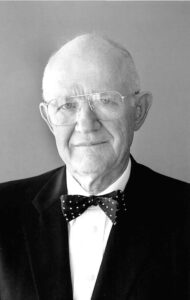 On August 9, John Welch, a Latham & Watkins retired partner, celebrated his 100th birthday with his children, grandchildren, great grandchildren, and great great grandchildren, an astounding 104 direct descendants in all. In his long life, he has positively influenced the lives of thousands of people. I’m one of them.
On August 9, John Welch, a Latham & Watkins retired partner, celebrated his 100th birthday with his children, grandchildren, great grandchildren, and great great grandchildren, an astounding 104 direct descendants in all. In his long life, he has positively influenced the lives of thousands of people. I’m one of them.
John grew up in northern Utah, graduated from Utah State University, served four years as an Army officer during World War II, earned his law degree from Harvard, and joined Latham in 1948.
I arrived at Latham thirty years later and became interested in labor law early on, but I was reluctant to join the firm’s Labor Department. My one and only reservation was John Welch. By then, he was the chairman of the department, a giant in labor law circles, and the most stern, intimidating person I’d ever encountered.
For a junior attorney, meetings with him were an experience in psychological torture. When I entered his office, he wouldn’t acknowledge my presence in any way for at least a full minute. Even when he finally looked at me, he remained silent until I volunteered my reason for darkening his door. From there on, he grilled me with questions I hadn’t anticipated. As I stammered through a series of insipid answers, his cold stare reduced me to a puddle of water. After each meeting, I expected the firm to fire me by the end of the day.
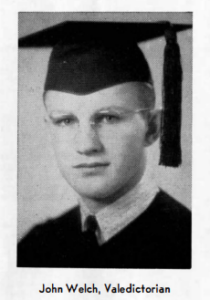
When my fear of John Welch was at its zenith, Latham decided to open a Washington, D.C., office, and the firm’s Managing Partner, Clint Stevenson, asked me to be the new office’s only labor lawyer. I was stunned, in part because I was only in my third year of practicing law and didn’t think I had enough experience to do the job, but more importantly, because I was convinced the Labor Department Chairman considered me an idiot.
“What does Mr. Welch think about this?” I asked anxiously.
Clint seemed puzzled by the question. “We wouldn’t assign you to the position if John didn’t have full confidence in you.”
When I recovered from shock, my ego took over. All the big wheels in firm management wanted me to relocate to Washington, so I figured taking the job would score points with them and launch my career like a rocket to the stars.
When John met with me, I saw a different side of him. He didn’t mention the firm’s interests. He focused solely on what was best for me. “Slow down,” he said. “Think this through. Don’t get swept away by the tide.”
I didn’t heed his advice. The tide was swift; my ambition blinded me; and I moved to Washington. It proved to be a terrible mistake. For reasons unrelated to me, the firm’s major east coast labor client dumped us, and my rocket crashed and burned.
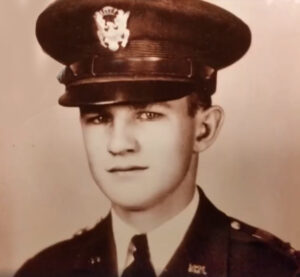
I called John and told him I wanted to come back to LA. We met with Clint. He was determined that I stay in Washington. We went back and forth until John said to Clint, “Ken’s return to LA is best for him, best for the Labor Department, and best for the firm. So get it done.”
Clint got it done, but when I returned to LA, I was running scared. Clint wasn’t pleased with me, and Carla Hills, the Washington office Managing Partner, wanted me fired. Sensing my state of panic, John sat me down. “Calm down,” he said. “Do good work, and you’ll be fine.”
This time I listened to him, and over the next several years, John gave me guidance with a light touch at the critical moments when I needed it most. With his help, I rebuilt my career and survived.
A few years later, my-five-year old son fell prey to a rare disease. By the time the doctors diagnosed it correctly, his condition was critical. I dropped everything at work, and my son and I moved into a children’s hospital. John visited us our first day there. After a game of Chutes and Ladders, he took me aside. “Don’t worry about anything at the office,” he said. “We’ll cover your work. You stay here with your son until he gets well.” His deliberate use of the word “until,” and not “if,” helped steel me for the coming days.
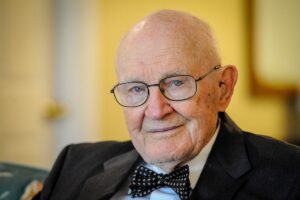
My son made a full recovery, thank God, and I returned to work with a different mindset. Up to that point, I’d made the bad choice of elevating my career above my family. I wanted to change my ways. When the local soccer league asked me to coach a team, I faced the first test of my new-found resolve. To coach, I had to commit to two weekday afternoon practices during the season. I couldn’t see how I could leave the office early and still manage my caseload.
I mentioned my dilemma to John. “You can do both,” he said.
“How?”
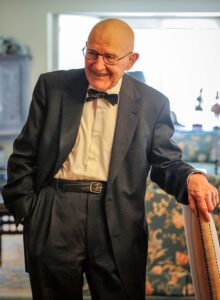
“Treat the soccer practices like a client commitment. When you plan to meet a client at four in the afternoon, you put it on the calendar, block out the time, and rearrange your schedule to complete the rest of your work. Do the same with the soccer practices. Put them on your calendar and treat them like a client meeting.”
That simple suggestion worked and it changed my life. I coached my kids’ teams for a decade and spent more time with my family. My balance between family and work wasn’t always perfect from there on, but I became a better husband and father.
Shortly before John’s 100th birthday, Latham facilitated a zoom conference call of retired partners who were close to him. The goal was to produce a video from edited excerpts of our statements about John. We were asked to choose a word or phrase that best describes him and to tell stories about our experiences with him. Wise, steadfast, professional, and determined were words the others chose as they spoke about his positive impact on their lives. My phrase for John was life coach, and I told the stories I’ve related here. When I came to the part about John’s visiting me and my son in the hospital, I broke down and had to regroup before I could go on. Forty years after my son’s illness, my gratitude for John’s encouragement and compassion during the biggest crisis of my life overwhelmed me during the taping, and it did again as I wrote this.
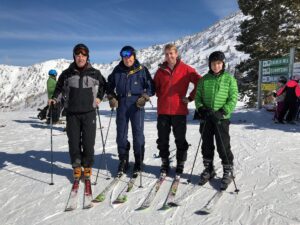
John has brought to the art of living a grace, dignity, and consistency unprecedented in its quality and longevity. In my view, 100 years of John Welch isn’t enough. In August 2021, when this pandemic is over, I’m looking forward to a face-to-face celebration of year 101.
Post Script: In addition to John’s prodigious intellect, he’s an amazing physical specimen. When he was 63 and I was 36, he invited me to run six miles with him. I’d been running for a while and thought I was in good enough shape to keep pace with him. I was wrong. He ran me into the ground. “Nice easy run, Ken,” he said, slapping me on the back at the finish line. When he was out of sight, I went behind a hedge-row and threw up.
He made backpacking trips to the high Sierras regularly into his 80’s. He climbed Mount Whitney five times. A helicopter took him on 44 trips to the highest peaks of the Canadian Rockies and dropped him off to ski the steep slopes, and he continued skiing into his late 90’s. An internet sports publication taped a documentary about his fitness regimen when he was 95. It’s less than four minutes long and gives you a good sense of who he is. You can see it here: https://www.facebook.com/peoplegettingfit/videos/1553166878343180.
John was the ninth attorney to join Latham & Watkins. Today, it employs 2600 attorneys in 29 cities all over the world. He is the firm’s first and only retired partner to reach the age of 100.
Footnote: The last three photographs in this post appeared in a May 4, 2018, article in the Deseret News.



August 18, 2020 @ 8:23 pm
I remember when he visited me to welcome me into the partnership. It meant more to me than any other congratulation, because he expressed “joy” at my admission, and I had long heard that meant I was truly welcomed into the partnership.
August 19, 2020 @ 8:08 am
In the video about John we taped for the firm, Tom Pfister said John schooled him about partnership admission when he was on the Associates Committee. John believed the admission decision should be joyful to be legitimate. His stern demeanor made his joy and compassion more meaningful when you were on the receiving end of it. I can also tell you that John never said anything he didn’t mean. He was genuinely joyful upon your admission. So was I and everyone else at the time, but John had the grace and thoughtfulness to tell you so.
August 14, 2020 @ 7:42 pm
What a beautiful story thank you for sharing and it brought me to tears when you talked about your son ❤️?
August 14, 2020 @ 8:39 pm
Thanks, Janet. It was an emotional time that turned out well, thank goodness.
August 14, 2020 @ 11:39 am
Fantastic story Ken. Thanks for sharing.
August 14, 2020 @ 1:24 pm
Thanks, Mike. Good to hear from you again!
August 14, 2020 @ 11:21 am
Nice tribute, Ken. I won’t mention Robert Chesney (the deaf-mute) or the Big 5 arbitration John dumped on me because it was a dead-bang loser with a drug addict as our undercover informant.
August 14, 2020 @ 1:23 pm
Ha ha! Better you than me, my friend!
August 14, 2020 @ 11:16 am
Ken. You were lucky to have such a wonderful mentor who knew just what to say. It rubbed off on you — you’ve been a big help to me with your perspective and words of encouragement through the years.
What an inspiration Mr. Welch is — he’s walking as fast as I do in the video. ?
Thanks as always for sharing your stories. You’ve had a wonderful life.
August 14, 2020 @ 1:23 pm
Thanks, Lucian! I learned so much from John. He’s amazing in that video, taking the steep grade at 95, and in that ski picture at Alta when he was 97. He also used to walk up the stairs to our offices every morning at dawn. We were on the 46th floor. I was very lucky to work with him.